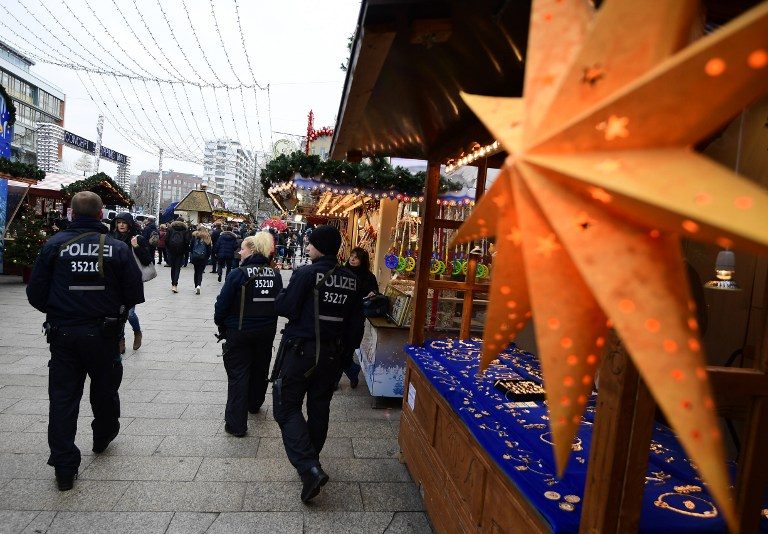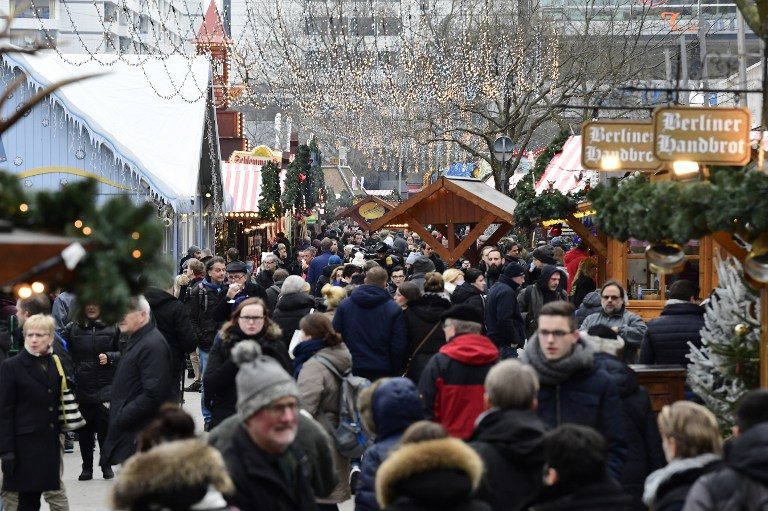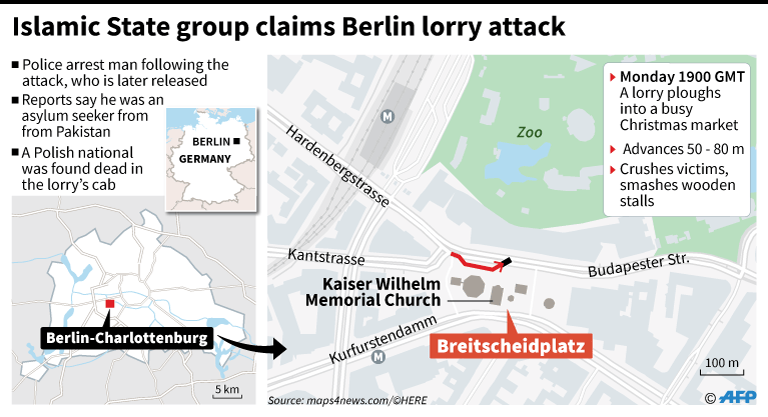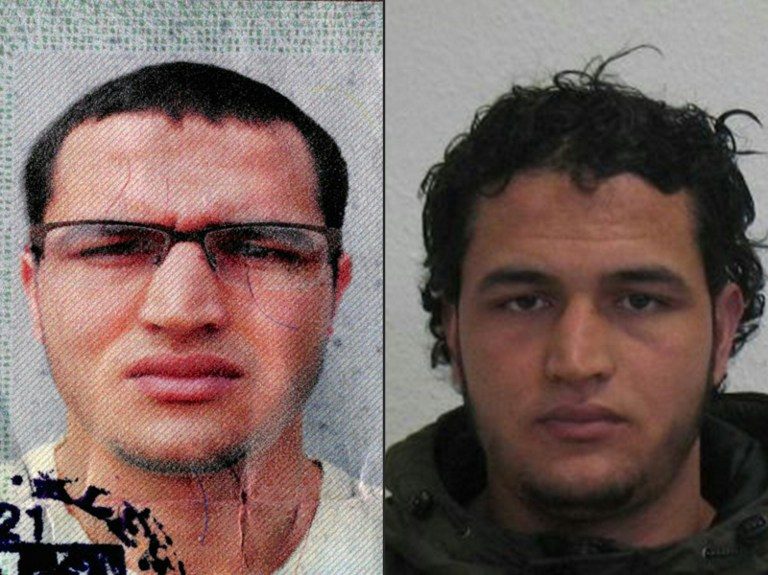SUMMARY
This is AI generated summarization, which may have errors. For context, always refer to the full article.

BERLIN / FRANKFURT, Germany – German authorities came under fire Thursday, December 22, after it emerged that the prime suspect in Berlin’s deadly truck attack, a rejected Tunisian asylum seeker, was known as a potentially dangerous jihadist.
Prosecutors have issued a Europe-wide wanted notice for 24-year-old Anis Amri, offering a 100,000-euro ($104,000) reward for information leading to his arrest and warning he “could be violent and armed”.
A temporary residence permit believed to belong to Amri, alleged to have links to the radical Islamist scene, was found in the cab of the 40-tonne lorry that rammed through a packed Christmas market in Berlin Monday, killing 11.
The twelfth victim, the hijacked truck’s Polish driver, was found shot in the cab.
The daily Sueddeutsche Zeitung said that investigators had also found Amri’s fingerprints on the door of the truck.
In a sign of defiance, Berliners flocked to the Christmas market at the central Breitscheid square which reopened for the first time since the articulated truck cut a swathe of death and destruction through the festive crowd.
Organizers dimmed garish lights and turned down the party music but began serving mulled wine and opened the traditional market huts, as visitors left a sea of flowers and candles for the victims and signs reading “Love Not Hate”.
Amid an unobtrusive police presence, stony-faced vendors embraced each other, some weeping as they opened their stands.
The chairman of the Berlin association of market vendors, Michael Roden, admitted he had struggled with the decision to resume operations.
“We are still stunned and deeply shocked. Our thoughts are with the injured, the dead and their families,” he said.
“In a situation like this, it’s very difficult to know what the right thing to do is.”

‘They did nothing’
The attack, Germany’s deadliest in recent years, has been claimed by the Islamic State (ISIS) group.
Among the confirmed dead were 6 Germans and an Israeli woman, Dalia Elyakim, 60. A total of 48 people were injured.
Italy on Thursday confirmed that one of its nationals, a young woman called Fabrizia Di Lorenzo, also died in the attack.
But as the manhunt intensified, questions surfaced about how the suspect had been able to slip through the net, avoiding arrest and deportation despite being on the radar of several security agencies.
“The authorities had him in their crosshairs and he still managed to vanish,” said Der Spiegel weekly on its website.
The top-selling daily Bild’s frontpage headline screamed “Deportation Failure!” while local tabloid B.Z. said starkly “They knew him. They did nothing” next to a photo of the dark-haired Amri.
Conservative lawmaker Stephan Mayer, a critic of Chancellor Angela Merkel’s liberal stance on asylum, told public radio that the case “held up a magnifying glass” to the failings of her migration policy.
But Armin Laschet, a deputy leader of Merkel’s Christian Democrats, placed the blame with regional security authorities, calling their inability to keep tabs on Amri “shocking”.

In a revelation likely to stoke public anger, German officials said they had already been investigating Amri, suspecting he was planning an attack.
The interior minister of North Rhine-Westphalia state, Ralf Jaeger, said counter-terrorism officials had exchanged information about Amri, most recently in November, and a probe had been launched suspecting he was preparing “a serious act of violence against the state”.
Berlin prosecutors said separately that Amri had been suspected of planning a burglary to raise cash to buy automatic weapons, “possibly to carry out an attack”.
But after keeping watch on him from March until September this year they failed to find evidence of the plot, learning only that Amri was a small-time drug dealer, and the surveillance was stopped.
Since the attack, police have searched a refugee center in Emmerich, western Germany, where Amri stayed a few months ago, as well as two apartments in the capital.
The New York Times reported, citing US officials, that Amri had done online research on how to make explosive devices and had communicated with ISIS at least once, via Telegram Messenger. He was also on a US no-fly list.
Der Spiegel reported that German government wiretapping against “hate preachers” had indicated that Amri had offered to carry out a suicide operation but that his statements were too vague for prosecutors to use.
‘In shock’

In Tunisia, Amri’s family expressed disbelief on hearing he was wanted.
“I’m in shock, and can’t believe it’s him who committed this crime,” his brother Abdelkader Amri told Agence France-Presse.
But “if he’s guilty, he deserves every condemnation. We reject terrorism and terrorists – we have no dealings with terrorists.”
Amri left Tunisia after the 2011 revolution and lived in Italy for 3 years, a Tunisian security source told Agence France-Presse. Italian media said he served time in prison there for setting fire to a school.
He arrived in Germany in July 2015 but his application for asylum was rejected this June.
His deportation, however, got caught up in red tape with Tunisia, which long denied he was a citizen.
Germany had until now been spared the devastating jihadist carnage that has struck neighboring France and Belgium.
But it has suffered a spate of smaller attacks, including two assaults in July that left 20 people injured. Both were committed by asylum seekers and claimed by ISIS.
The Berlin carnage evoked memories of the July 14 truck assault in the French Riviera city of Nice, where 86 people were killed by a Tunisian ISIS sympathizer. – Rappler.com
Add a comment
How does this make you feel?
There are no comments yet. Add your comment to start the conversation.